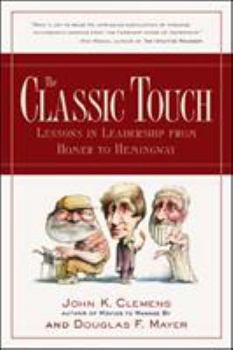Classic Touch PB
We all think that management is a twentieth-century, newly invented skill, but its roots go back thousands of years. This book is essential reading to learn that we cannont deal with today's problems without understanding yesterday's. -- Leonard A. Lauder, President, Estee Lauder Companies A classic way to solve business problems. -- U.S. News & World Report In Homer's day, a hostile takeover meant blood and arrows, not mergers and layoffs...
Format:Paperback
Language:English
ISBN:0809227975
ISBN13:9780809227976
Release Date:October 1999
Publisher:McGraw-Hill Companies
Length:320 Pages
Weight:0.95 lbs.
Dimensions:0.7" x 5.4" x 8.2"
Customer Reviews
3 ratings
Interesting Approach Keeps the Pages Turning
Published by Thriftbooks.com User , 23 years ago
Many books on "leadership" fail to hit their mark because they are too abstract and can't maintain the reader's interest. That is not the case with this book. By using characters from classic literature to illustrate leadership characteristics the authors manage to find a unique balance between substance and style that really works. The leadership lessons from the classics are still applicable today and this book gives them a fresh perspective by relating them to the modern business environment. The authors also complement the examples from classic literature with some excellent examples of recent management approaches. The result is terrific.
A Matrix of Correlations
Published by Thriftbooks.com User , 24 years ago
I enjoyed reading this book so much that I re-read it within a week. Then I went back and re-read all of the classics it discusses. The core concept is intriguing: Re-visit the major works of various authors (from Homer to Hemingway) to uncover lessons in leadership. The authors found them in abundance. For example: The importance of understanding the dynamics of teamwork (Agamemnon and Achilles); knowing the right questions to ask...and the best way to ask them (Socrates); managing change while adapting to new realities (Ajax); the complexities (and difficulties) of management succession (King Lear); making unpleasant but necessary decisions (Machiavelli); Simplify! Simplify! (Henry David Thoreau); and forging consensus during a crisis (Hemingway's Robert Jordan). The authors also examine the works of Plutarch, Pericles, Chaucer, Castiglione, Edmund Burke, Charles Darwin, and Arthur Miller. Throughout this highly readable book, the authors also examine a number of corporations which have either applied various leadership lessons with great success or experienced serious problems for failing to do so. Who will derive the greatest benefit from this book? I highly recommend it to those in positions of leadership who appreciate world literature (albeit in translation) and are constantly seeking different perspectives on the marketplace in which they and their respective organizations compete. Also, to young executives whose professional reading -- to date -- has been limited to various business publications and (perhaps) to the latest "hot" business books. Finally, to those recent college and university graduates with liberal arts degrees who (erroneously) think that great world literature and the free enterprise system are incompatible. On the contrary, as Clemens and Mayer suggest, they are whole cloth...and many of their common threads are worthy of thoughtful consideration.
Fascinating, really helpful
Published by Thriftbooks.com User , 25 years ago
I picked up this book because of its really beautiful cover. I love the Hemingway illustration. But I love what's inside as well. Clemens and Mayer just write with such clarity and good humor, making this a joy to read. And what they say really makes sense for me, as I'm a manager of a small company that is going through a lot of transition. I'm going to get their other book, Movies to Manage By.





